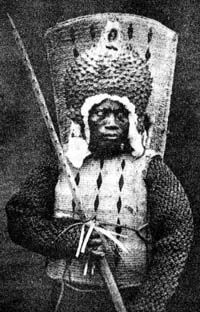Nauruan Civil War
| Nauruan Civil War | |||||||||
|---|---|---|---|---|---|---|---|---|---|
 Photo of a Nauruan warrior in the Nauruan Civil War around 1880 wearing traditional battle armour. | |||||||||
| |||||||||
| Belligerents | |||||||||
|
King Aweida loyalists | Anti-Aweida rebels | ||||||||
| Commanders and leaders | |||||||||
| King Aweida of Nauru[1] | Unknown rival claimant[1] | ||||||||
| Units involved | |||||||||
|
Loyalists | Rebels | ||||||||
| Casualties and losses | |||||||||
| Nauruan population reduced from 1400 to 900, a 36% decrease in the population.[2] | |||||||||
The Nauruan Civil War was fought from 1878 to 1888, between forces loyal to incumbent King Aweida of Nauru and those seeking to depose him in favour of a rival claimant. The war was preceded by the introduction of firearms to the island and its inhabitants, Nauruans, as a whole. For the majority of the war, the loyalists and the rebels found themselves in a stalemate, with one side controlling the northern and the other the southern part of the island.
In 1888, the German Empire intervened by restoring Aweida to the throne and confiscating combatants' firearms; by the time they finished, the German soldiers had confiscated 791 rifles from both belligerents, nearly one gun for every remaining living adult inhabitant of the island. By historical estimates, Nauru had a population of approximately 1,400 in 1848; by the end of war, there were about 900 inhabitants.[2]
Having effectively been put under German control with the civil war's ceasefire, Nauru was shortly thereafter annexed into the German colonial empire, as part of German New Guinea.
Background
When the British captain
Course of the war
Outbreak
The conflict began during a marriage festival; while discussing a point of etiquette, which turned into a heated argument; one of the guests fired a pistol and fatally shot the son of a clan chief. The need to avenge the man's death was perceived as clear in a Nauruan cultural context. Former feuds had their origins in similar incidents, but this time every family in every tribe's clan had guns, exacerbating a potential conflict.[3] The conflict saw the island divided into a north and a south.[4]
War reports
A squadron of the British Royal Navy anchored off the coast of Nauru on September 21, 1881, and the squadron's flagship approached the island, to appraise the local situation. An acculturated local beachcomber, William Harris, boarded the British ship, which summoned the rest of the squadron by semaphore that evening, saying that a tribal war was raging, that all of the islanders were drunk, that the actual king of the island, Aweida, wished to have missionaries come to the island to help stop the war.
Six years later, an
German annexation and end of the war


The war helped neither the island's copra production nor the interests and securities of the German merchants, who had established cocoa plantations and other agricultural establishments. Because the political instability affected the German holdings directly, German authorities recommended that Germany take over the administration of the island. Germany annexed the island on April 16, 1888, banning both alcohol and firearms. On October 1 of that year, the German gunboat SMS Eber, with 87 men, anchored off the coast of Nauru. The armed German seamen met with Harris and returned with the first European settlers, as well as a Christian missionary from the Gilbert Islands. The next morning saw the arrest of the remaining tribal chiefs and the German annexation ceremony, complete with the hoisting of the German flag. German authorities declared that unless all firearms and munitions were turned over to the German government in one day, the chiefs would be executed; the next morning, the natives of the island turned over 765 weapons and several thousand rounds of ammunition, ending the bloodiest tribal war in Nauruan history.
Aftermath
The annexation of Nauru by German Empire brought about a lasting ceasefire. After the annexation, King Aweida nominally retook the throne, and Nauru became part of German New Guinea.
References
- ^ a b "The Nauru War - The Smallest Armed Conflict in History". MilitaryHistoryNow.com. 2013-02-18. Retrieved 2019-08-05.
He described how two factions battled ceaselessly for control — one group was headed by Aweida, the king of the island. The other was an opposing rebel clan led by a white chief who claimed the throne for himself. The British fleet noted the situation, took Harris aboard and sailed away.
- ^ a b "Background Note: Nauru". U.S. Department of State. March 13, 2012. Archived from the original on October 17, 2012.
- ^ "The Nauru War - The Smallest Conflict in History". MilitaryHistoryNow.com. 2013-02-18. Retrieved 2022-01-03.
The conflict, which was fuelled by equal parts locally-made palm wine and European armaments, broke out during a wedding feast on the three-kilometre-wide island in 1878. A disagreement between two guests over the finer points of dining etiquette grew hostile, at which point one of the debaters produced a pistol and began blazing away. A stray bullet struck the son of a clan chief killing him. The island's factions, who were already nursing old grudges, used the occasion to attack one another. The fighting escalated from there.
- ISBN 9780960627202.
This pervasive influence ended, in 1878, with a full scale war which broke out between the people of the Northern and Southern districts.
